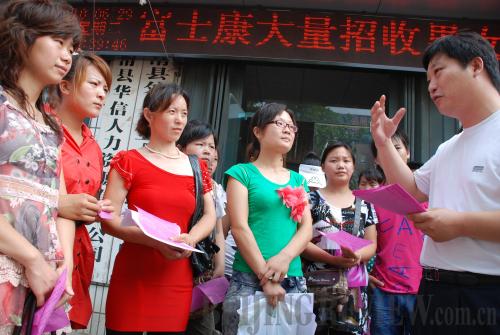|
 |
|
BETTER PAY: A Foxconn recruiter talks to prospective employees about its new plant in central China's Henan Province. Employees will receive a monthly salary of at least 1,200 yuan ($176) for the first three months, followed by a raise to at least 2,000 yuan ($294) after being formally recruited, both much higher than Henan's new minimum monthly wage of 600 yuan ($88) [CNSPHOTO] | Labor crunch
Cities around the Pearl River Delta in south China were the first to be opened to foreign capital three decades ago. To date, the region is home to one of the world's densest clusters of export-oriented industrial estates.
In the wake of the global financial crisis, many migrant workers returned home from the coastal areas to find that landing a job in nearby factories wasn't too difficult. When the coastal machines buzzed again, managers were caught off guard: The workers were unwilling to return.
"We raised salary not because of the Foxconn incident, but because we needed skilled workers, and increasing salaries is the only way to attract them," said Yang Jin, Human Resources Director at Forward Shoes Co. Ltd. in Dongguan, Guangdong Province.
Tian Dan also said the competition for skilled workers is intense, and better payment is the most efficient and convenient way to attract skilled workers.
Earlier this year, Zhejiang Province said it had 383 jobs for every 100 registered job hunters, while Guangdong Province, the manufacturing powerhouse of the country, said its factories were short of about 900,000 workers in February.
Many had feared the wage increase will drive away foreign investors, or jack up the prices of manufactured goods, which would eventually lead to consumer price inflation.
"Honestly, this round of wage increases will not influence foreign-invested companies. The scale and range of the wage increases is too miniscule for those deep-pocketed foreign manufacturing tycoons," said Zhong Dajun, Director of the Beijing Dajun Economic Observation and Research Center, a private Beijing-based institution.
Zhong said the reports and rumors about foreign business leaving China due to salary increases are groundless, and were played up by certain interest groups who do not want to spend extra money on payments and want to maximize their profit.
Learning to adjust
Salary increases may affect factories' profits, especially for low-end manufacturers who earn only a $1 profit selling 100 pairs of socks.
The rising labor costs could force companies to upgrade their technology and move up the value chain.
Lin Jiang, a professor on Dongguan economics at the Guangzhou-based Sun Yat-sen University, conducted a survey in Dongguan, a manufacturing center in Guangdong. His research results showed companies in Dongguan are able to endure a 3-5 percent salary increase on average and 10 percent would be the maximum they could bear.
Lin said under such circumstances, the only way out for manufacturers would be to apply new technology and reduce their reliance on workers.
Tian said Neo-Neon Holdings Ltd. has been automating its facilities to reduce the use of labor. The company once hired 15,000 workers, but the number has been reduced to around 10,000.
The Chinese Government has said on many occasions China should upgrade its economic and industrial structure. Lin suggested the government offer tax breaks for small and medium-sized companies and give them time to upgrade.
Wage comparison
Compared with wages in the United States, Chinese labor is much cheaper and Chinese workers earn next to nothing.
According to U.S. job search website Indeed.com, the average annual salary for U.S. autoworkers was $48,000—$70 an hour plus benefits—as of February 2010.
But their Chinese counterparts aren't so fortunate. A survey conducted by China Business News in May this year showed the average annual salary of Chinese autoworkers was between 10,000 yuan ($1,460) -70,000 yuan ($10,250).
That means Chinese autoworkers must work standard hours and overtime for a whole year to get one-month's salary of American autoworkers.
"What matters to wages is not headlines or government regulations but the balance between supply and demand for labor," says Derek Scissors, research fellow at The Heritage Foundation, in an interview with Beijing Review.
Originally, the Chinese Academy of Social Sciences predicted labor supply growth to stabilize in 2008. If supply growth is already weakening, that would genuinely push wages up, but it seems too soon for that, said Scissors.
China will be the world's biggest manufacturing base for at least two more decades, unless global trade collapses, he said.
| 